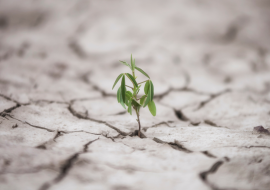
What People Experience After a Major Earthquake?
Natural disasters are a part of the world we live in. While we can accept this scientifically and physically, dealing with the effects is not so easy. An earthquake can cause not only the collapse of buildings but also disrupt other aspects of our lives. At a time when what we all need the most is safety and security, and building it throughout our lives is already challenging, adapting to the sudden change and shocking losses caused by an earthquake is quite difficult. At this stage, the impact of the earthquake begins with shock. This is one of the defense mechanisms the body employs against sudden changes. After the shock effect, high levels of anxiety and fear emerge. There may be sensitivities such as startle reactions, nightmares, and repeatedly reliving the moment even with the slightest stimulus. Shame, a sense of insecurity, and disappointment may accompany these feelings.
Methods to Overcome the Fear of Earthquakes
The primary rule in overcoming all fears and anxieties is to believe. Believing that you can overcome this fear is crucial.
We should try to change our perception of the post-earthquake “The world is not a safe place.” We need to focus on our routine life and activities that will benefit us.
Don’t keep your fears inside, don’t suppress them. Try to share them as much as possible and explore the meanings behind your fears.
If precautions are taken, not every earthquake is deadly or highly disruptive. It is possible to be protected in an earthquake with well-built foundations and taking measures for earthquakes (emergency kit, earthquake awareness, taking courses).
Instead of avoiding your fears, try to confront them.
We Are Not Helpless
Those who experience the earthquake themselves or witness it feel helpless during this period. Those who experience it strengthen their coping skills more than any of us. They become stronger than all of us and hold on to life once again. Those who only witness it feel a profound sense of guilt, thinking that there’s nothing we can do, and it might happen to us one day. However, just like wishing well to the earthquake victims, providing them with the necessary material and moral support, and most importantly, learning from this disaster to become more conscious, you have a reason to be stronger in the future.
Physical and Psychological Support Is Important
Realistic beliefs and thoughts about newly emerging or experienced earthquakes can eliminate the emotional, physical, and mental symptoms of earthquake fear and gradually reduce avoidance behaviors.
Psychological Jolt (Feeling Like There Will Always Be an Earthquake)
There is always a feeling as if there will be a constant earthquake. Even though our entire perception and focus are on the earthquake right now, as long as we take precautions, the places we believe to be the safest are still very safe. Even though the thought of losing everything we have, both materially and spiritually, in a few seconds is terrifying, it is impossible to control, and even if these were always part of routine life, we must learn from the changing emotions and thoughts without falling into despair. Please consider, accept, and look at the changing emotions and thoughts as normal reactions we all give after shock, cognitively, emotionally, and behaviorally.
What Is Psychological First Aid?
Providing supportive intervention at that moment to individuals who have recently experienced a serious crisis situation and need help, ensuring that the person remains stable, facilitating access to long-term support when needed, and helping to reduce or extinguish acute distress. At this point, we are not talking about psychological counseling, treatment, or diagnosis.
Basic Principles of Psychological First Aid
Observing
Listening
Building a connection
Emotional Responses That Can Occur After Crisis Situations
Sadness
Anxiety
Panic
Helplessness
Anger
Shame
Confusion
Denial
Fear Numbness
Depressive mood
Restlessness
Disappointment Supporting
Children During the Grief Period (0-2 Years)
The baby feels the absence of the person they are attached to during this period, so this situation is painful for them. To comfort the baby, it is beneficial to sing a song or lullaby, establish physical contact (hug, hold), encourage them to play with their favorite toy, and accompany them in their games. It is important to maintain the baby’s routines (feeding time, sleep schedule, shelter), and they should not be left alone.
Stages of the Trauma Process
- Shock Phase: A stage where nothing is perceived, and all receptors are locked. It is a phase dominated by numbness.
- Denial Phase: In this stage, expressions and feelings such as “It can’t be, No, I don’t believe it” dominate. The person cannot accept and denies that the events happened to them. Intense feelings of horror, helplessness, and confusion prevail.
- Guilt Phase: Regret and remorse are experienced in this phase, and the person sees themselves as the cause of the trauma. Thoughts like “If only I had done this differently, if only I had done that, these wouldn’t have happened” dominate.
- Anger Phase: It is a stage where intense feelings of anger are felt towards oneself, the lost person, or other people and situations. Sometimes intense anger is directed at fate.
- Acceptance Phase: Breaking resistance, allowing pain. It is a process of accepting and surrendering to live with the experiences. In this final stage, the process of making sense comes into play, and the person begins to look at what happened from a more objective distance. They accept what happened to them.












